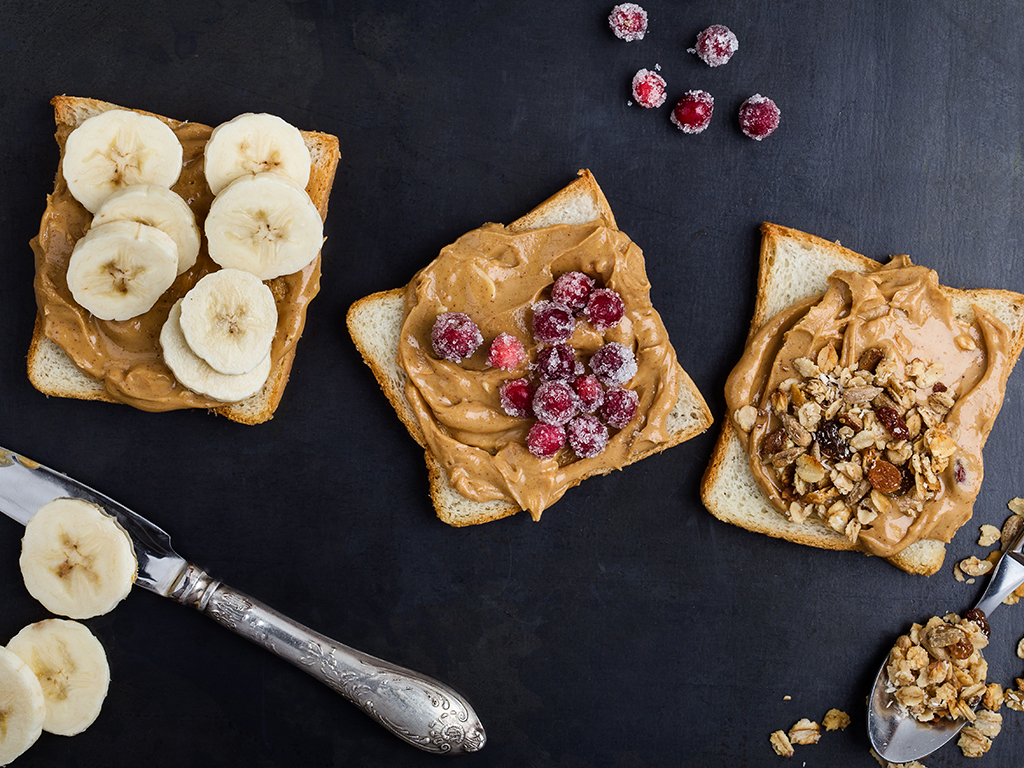Peanut butter is good for a lot more than a classic sandwich with jelly.

Drizzled on apple, spread on crackers, and pressed into protein balls, peanut butter is a good source of protein, healthy fats and fibre. But nuts are high in fat — and peanut butter is no exception. So how do you know if you’re eating too much of the sticky stuff?
WATCH BELOW: The nutritional power of peanuts

If you’re eating it straight out of the jar, chances are you’re overdoing it, said Jennifer Sygo, a Toronto-based registered dietitian and sports nutritionist.
“It’s a relatively high-calorie food,” Sygo told Global News. “If someone is eating it mindlessly, especially if it’s in front of the TV, or they’re eating it emotionally, it would be certainly easy to get more calories than you might expect from snacking on peanut butter.”
The health benefits of peanut butter
Just because you shouldn’t eat an entire jar in one sitting doesn’t mean you should stay clear of peanut butter.
- Naloxone-resistant street drug linked to 9 deaths in Eastern Canada seized in Alberta
- ‘She gets to be 10’: Ontario child’s heart donated to girl the same age
- Buzz kill? Gen Z less interested in coffee than older Canadians, survey shows
- Bird flu risk to humans an ‘enormous concern,’ WHO says. Here’s what to know
Nuts are nutrient-dense foods. They’re full of protein, rich in a number of vitamin and minerals, are a good source of dietary fibre, and high in unsaturated fat (the healthier kind). Because of their nutritional profile, peanut butter can satisfy your hunger for a longer period of time, preventing mindless snacking between meals.
READ MORE: Too much of a good thing: Is there such a thing as eating too much avocado?
Research shows that eating nuts may help reduce the risk of heart disease, as well as diabetes in women. Nuts are also a good source of vitamin E, which can be hard to get from other foods in our diets, said Sygo.
But it’s best to consume the natural stuff — not peanut butter that’s loaded with salt and sugar, said Felicia Newell, a registered dietitian, nutritionist and personal trainer at Sustain Nutrition and The Energy Company in St. John’s, Newfoundland.
“Peanut butter is made from ground peanuts, but some products have extra additives such as sugar, additional oils, and other additives to help prevent separation,” Newell told Global News.
WATCH BELOW: Yes, it’s OK to eat dessert every day – in moderation, says registered dietitian

“In some products, sugar is the first or second ingredient, so you really want to watch out for that. Ideally, the best choice is a peanut butter with one ingredient listed: peanuts.”
How much peanut butter should you be eating?
A tablespoon of natural peanut butter — which is just the nuts, no added salt or sugar — has around 90 calories and seven grams of fat. If you generously scoop two to three spoonfuls on toast, that’s easily upwards of 200 calories and 14 grams of fat.
With that in mind, it’s important to know what your health needs and goals are, and portion accordingly, said Newell.
“If someone’s daily calorie needs were only 1400 calories per day … four tablespoons could take a chunk out of that quickly, especially if you’re consuming a varied diet,” she said. “Again on the other hand, an athlete may need 3000-4000 calories per day or more, so four or even six tablespoons per day wouldn’t have much of an impact on that.”
READ MORE: LeBron James says his kids drink wine at home — is this dangerous?
Consult your doctor or dietitian if you’re not sure how much PB you should eat, but a good general rule of thumb is around one to two tablespoons a day. Newell said a healthy serving of any high-fat food is roughly two tablespoons.
Tips to prevent yourself from overdoing it
Just like with raw nuts, portion is key. While peanut butter is a great source of protein, it’s also high in fat, and it’s tasty texture makes it easy to overdo it.
To prevent yourself from eating too much, measuring out your peanut butter is a good idea. You can mix half a tablespoon of peanut butter into your morning oatmeal to keep you full for longer into the day, or spread a tablespoon over crackers as a snack. Homemade peanut butter protein balls are also a good way to portion your intake, as you’ll know how much you’re consuming compared to buying store-made products.
Having your peanut butter with some fruit, like an apple or banana, Sygo said, is another way to keep your PB intake in check. Pairing it with another food also gives you a variety of flavour.
“The key is to take your portion and have it with that other food and be done with it rather than eating it straight out of the jar,” Sygo said.
“Eating the food without any sense of portion, like the old trick where you’re standing with the knife and just putting it back in the jar over and over again … we’re better off to have it as part of a deliberate and conscious snack.”
Laura.Hensley@globalnews.ca




Comments